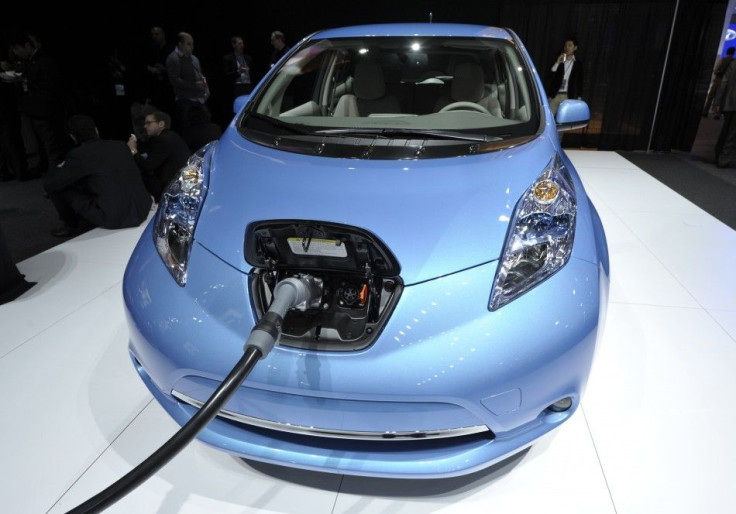Plug-In Cars And Hybrids Don't Save Money Until Decades After Purchase
Analysis

Plug-in cars and hybrids are all the rage, but new information reveals that many of them don't save their owners money until decades after they are purchased.
The Toyota Prius, Nissan Leaf and other such plug-in cars and hybrids have become status symbols for people who want to show their dedication to protecting the environment, but new studies show that though the vehicles are good for lowering their carbon footprint, many of them do not save drivers money in the short-term.
The perception for most people has been that the high price point of plug-in cars and hybrids pays for itself in short order through savings on fuel. But that assumption is being called into question, and inexpensive, efficient, gas-based cars are looking like the better option for many thrifty people who are purchasing vehicles as the economy begins to recover from the financial downturn.
New information compiled for the New York Times by auto research website TrueCar.com suggest that the much-touted financial benefits of these hot new vehicles have been over-hyped, and that drivers who really want to cut costs may want to consider other options.
According to the data, the Prius and the Lincoln MKZ are the only two models among the numerous plug-in cars and hybrids that are a good bet for people looking to save money at the pump.
The contention that these specialized vehicles are not a huge cost saver holds true at today's price of about $4 per gallon of gas, or even $5 per gallon, which is likely not a long way off, according to some energy market projections.
It even holds true for most plug-in cars and hybrids if gas rises to nearly $8 per gallon, according to the Times, which reports that if gas was that expensive it would still take the full six years that the average person owns a car for that person to make up the added purchase cost of buying such a technologically-advanced vehicle.
Though hybrid sales have gone up over 60 percent this year, they are still less than 3 percent of the total number of cars sold, and hybrids account for very little of the market, the Times reports, and General Motors has even stopped producing the Chevrolet Volt in the face of weak sales. As such, analysts say the market for such ultra-efficient cars remains lower than what many people have predicted or hoped to see.
The Prius and MKZ, however, begin to make sense on paper after two years, with purchase and driving costs staying below those of comparable non-hybrid models.
However, for example, the hybrid Ford Fusion would take 8.5 years to make itself a better investment than the regular, gas-powered Fusion with gas at $4 per gallon, or 6.5 years at $5 per gallon.
The point where a car can actually go after a mass-market audience is when the pricing starts making sense on paper, Jesse Toprak, vice president for market intelligence at TrueCar, told the Times. If they want these technologies to be mainstream, pricing still needs to come down.
And the fuel-price-tracking Lundberg Survey showed in March that in order for the Chevy Volt to be worth buying from a purely economic standpoint, gas would have to be $12.50 a gallon. But 93 percent of a recent survey of Volt owners told Consumer Reports that they would buy the vehicle again, suggesting that pure math is not the only reason people buy these vehicles, as many people purchase them for the environmental benefits alone.
But some purchasers of regular gas-powered cars find that they offer their fair share for their wallets as well as the environment without costing a huge premium to do so.
I, for instance, live in New York City and needed to purchase a vehicle at the beginning of 2011. I looked at the Prius (one of which my mother drives and has had a great experience with), and other plug-in cars and hybrids, but none were anywhere near fitting my budget. In the end, I purchased a 2007 Toyota Yaris sedan, which is small enough to fit in any crevice overlooked by larger NYC car-owners, has enough zip for the Long Island Expressway and West Side Highway, and had a surprising amount of space.
But the real icing on the cake was I got tremendous saving in gasoline over my previous vehicle (admittedly, it was a 1999 Honda Odyssey minivan.) My Yaris got about 32 mpg, nothing to sneeze at, while my mother's Prius only got about 37 mpg despite having a monthly payment about double that of my car. And I was doing much more city driving than she was in the suburbs of Maryland.
So for those of you who have dispensable cash enough for that 5 mpg differential to sway you, go ahead and cough it up for the superior model. But know that the benefits are not always as great as they are made out to be. And that you can rest easy driving a regular car and still doing your part for the world.
© Copyright IBTimes 2024. All rights reserved.











